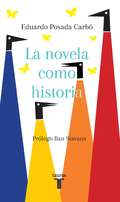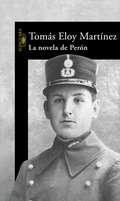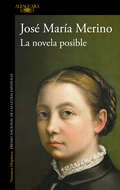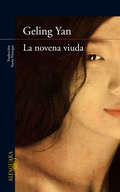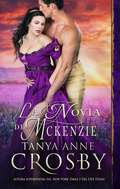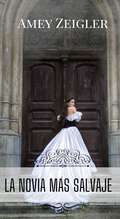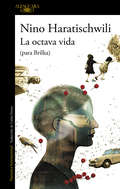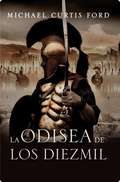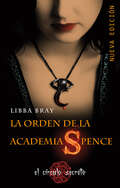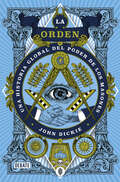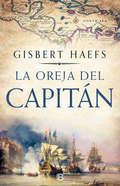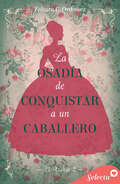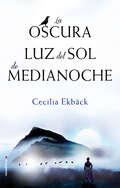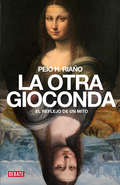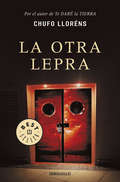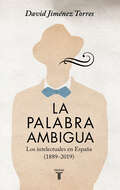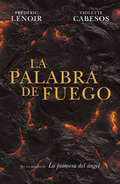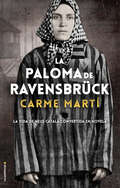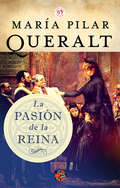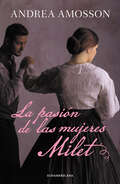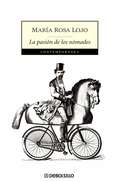- Table View
- List View
La novela como historia
by Eduardo Posada CarbóUn libro de ensayo que indaga entre la relación entre historia y literatura en el marco del Caribe. El libro acude principalmente a la obra García Márquez, de Fuenmayor y Marvel Moreno. <P><P>Reflexiones sobre la forma que toma la historia en la ficción, hechas por uno de los principales historiadores colombianos. Enfocado sus estudios en el Caribe colombiano, Eduardo Posada Carbó es un referente de los estudios literarios y de la historia. Su preocupación por el Caribe lo ha llevado a conectar las manifestaciones culturales, la producción artística, la historia literaria y social. El libro es una apuesta del autor por reunir cinco ensayos que presentan sus principales tesis sobre historia y literatura y su expresión en el Caribe colombiano.
La novela de Perón
by Tomás Eloy MartínezEl 20 de junio de 1973, el General Juan Domingo Perón regresa a Argentina tras dieciocho años de exilio. Le acompañan su esposa, José López Rega, oscuro intrigante surgido de la nada, y un numeroso séquito. En Madrid deja años de desprecio del régimen de Franco y el recuerdo de una triunfal Eva Perón cuyo cadáver momificado descansa en su propia casa. Con él lleva unas memorias inacabadas con las que quiere dejar una visión napoleónica de sí mismo. Más de dos millones de personas, la mayor multitud jamás congregada, le esperan en el aeropuerto. Mientras, sus seguidores luchan encarnizadamente por apoderarse del símbolo que aún representa el anciano General. Tomás Eloy Martínez, Premio Alfaguara 2002, resume en esta novela llena de acción y personajes la historia argentina del último siglo a través de la biografía de un hombre que encarnó la esperanza de su pueblo, al mismo tiempo que indaga en las múltiples caras que presenta la verdad y el poder que tiene la ficción para crear puentes entre todas ellas.
La novela posible
by José María MerinoLA NUEVA NOVELA DE JOSÉ MARÍA MERINO, PREMIO NACIONAL DE LAS LETRAS ESPAÑOLAS 2021 Un escritor y una bibliotecaria cautivados por una pintora del Siglo de Oro que triunfó en su época para luego ser olvidada «Nunca me pude imaginar que alguien me ayudaría desde un tiempo tan lejano...». Olvidada durante siglos, opacada por hombres artistas a los que se han atribuido los cuadros debidos en realidad a su genio, Sofonisba Anguissola fue una pintora extraordinaria que, sin formación pictórica ni conocimiento académico de la anatomía, se especializó en el retrato y el autorretrato, alcanzó un gran éxito en su época e, instalada en España, estuvo vinculada a la corte de Felipe II. José María Merino narra en La novela posible la vida de esta pintora con todo el rigor histórico, pero también con toda la amenidad que posibilita la ficción. Y la historia de esta mujer deslumbrante y su tiempo se entrelaza en el libro con otras dos, situadas en la época actual: la del propio escritor que, durante el confinamiento, escribe un diario en el que deja constancia de esos días inciertos y de cómo se inocula en él la semilla de la fascinación por la figura de Sofonisba, y la de una bibliotecaria que encuentra también en la pintora renacentista un rincón donde refugiarse en medio de una ruptura amorosa. En esta novela se mezclan de manera magistral los dos tiempos, el actual y el del Renacimiento, la realidad con la imaginación, la biografía con la autobiografía y la ficción, y la literatura con el arte. La crítica ha dicho:«[Destacamos] su maestría y excelencia en la creación de literatura fantástica en las modalidades narrativas de novela, novela corta, cuento y microrrelato, así como la inteligencia de sus reflexiones teóricas sobre la ficción. Todo un referente para sucesivas generaciones».Jurado del Premio Nacional de las Letras «Maestro del cuento, mago de las palabras, juguetón con los vocablos y defensor del lenguaje como herramienta para vivir más y mejor».Inés Martín Rodrigo, ABC Cultural «Merino ha sido siempre un maestro».Javier Rodríguez Marcos, El País «Merino ha aunado la potencia de su imaginación a una prosa cuidada, esmerada, de corte y elongaciones muy clásicas».Javier Ors, La Razón «La de José María Merino es una de las más grandes y ricas aventuras narrativas del último medio siglo».Miguel Lorenci, El Correo «Ha elaborado, durante décadas, una original literatura de la mixtificación creativa, crónica de esos otros mundos que también existen aunque estén en este».Jesús Ferrer, La Razón
La novena viuda
by Geling YanLa apasionante historia de una mujer que encarna la compleja historia reciente de China. «Todas ellas quedaron viudas aquella noche del verano de 1944. A partir de entonces en el pueblo de Shitun hubo nueve viudas en plena flor de la vida...» Ocho adolescentes se convierten en «viudas heroicas» tras liberar a ocho guerrilleros laoba de una muerte segura a manos de los japoneses. La novena viuda, Wang Putao, no recibirá los mismos honores que ellas. Huérfana desde muy niña, pasa a formar parte de la familia de Sun Huaiqing, un próspero comerciante, pero todo cambia tras el triunfo de la revolución comunista comandada por Mao Zedong. De la mano de esta joven impulsiva y tenaz, Geling Yan retrata la compleja historia reciente de China. Las colectivizaciones agrarias, las purgas de la Revolución Cultural, las luchas internas de los dirigentes políticos, las disidencias y las represiones que cambiaron la Historia se alternan con las batallas cotidianas y las intermitencias del amor en la apasionante vida de Wang Putao. Reseña:«Geling Yan destaca como eminente escritora de la diáspora china. Su obra de ficción ha alcanzado una altísima reputación tanto dentro como fuera de China.»Ha Jin
La novia de McKenzie
by Tanya Anne Crosby Lola FortunaIndependiente hasta la médula, Elizabeth Bowcock, también conocida como “Doc Liz”, decide criar a la hija de su única hermana, ya que se acaba de quedar huérfana. Desafortunadamente, el abuelo de la niña no considera apta a Elizabeth para la tarea y se niega a entregarle a la pequeña si no se casa antes… Cutter MacKenzie es un hombre de pelo negro y mirada de demonio. Apartado de la sociedad por su sangre Cheyenne. El guapo mestizo se ofrece como voluntario para hacerse pasar por el marido de Elizabeth. Y aunque su tremendo atractivo sexual pone en riesgo la independencia de Liz, no es el mayor peligro que encontrarán a lo largo del camino que tienen que recorrer juntos para llegar a St. Louis…
La novia del caballero de las cruzadas (Los campeones de Santa Eufemia #1)
by Claire DelacroixGaston luchaba por el deber y el honor, hasta que Ysmaine lo tentó a luchar por su amor ... Cuando el caballero templario Gaston hereda inesperadamente los bienes de su familia, sabe que necesita una esposa y un heredero. Un matrimonio de conveniencia con una viuda que necesita ayuda es una solución práctica y la pareja de recién casados abandona Jerusalén, encargándose de la entrega de un paquete para los Templarios. Lejos de la vida que ha conocido durante años, Gaston rápidamente se da cuenta de que poco está siguiendo su plan, especialmente su misteriosa esposa, cuya presencia despierta un fuego inesperado ... Ysmaine, que ha enviudado dos veces, duda de que se vuelva a casar alguna vez, y mucho menos de tener un matrimonio por mérito, hasta que se ve encantada por el rudo caballero que intenta defenderla. Ysmaine vuelve a casarse, no solo por su propia elección, sino con un guerrero cuyo honor admira. Está decidida a demostrarle a Gaston que el matrimonio tiene más que ofrecerles a ambos que un heredero, pero primero debe ganarse la confianza del hombre cauteloso con el que se ha casado impulsivamente ... Ninguno de los dos se da cuenta de que a Gaston se le ha confiado el tesoro de los Templarios, y mucho menos de que alguien en su pequeño grupo tiene la intención de reclamar el premio a cualquier precio. En un grupo de extraños con secretos, ¿podrá Gaston atreverse a confiar en su nueva esposa? ¿Podrá Ysmaine convencer a Gaston de que confíe lo que sabe? ¿Podrán resolver el acertijo juntos antes de que el plan del villano se haga realidad y todo esté perdido?
La novia más salvaje: La novia más salvaje
by Amey ZeiglerMaisie Brinley rechazó a todos los solteros de la élite de Boston que le propuso su madre, que buscaba ascender socialmente. Entonces, su madre le da un ultimátum para que se case con un amigo de la familia, pero él tiene el doble de edad que Maisie. Después de escribirse con un extraño cuyas cartas llegan a su corazón, Maisie cruza el continente en busca de su amor. Cuando se conozcan, ¿estará él a la altura de sus expectativas o su huida será en vano? Cyrus Haddock, un armero que vive en Wylder, en el territorio de Wyoming (donde los hombres superan en número a las mujeres en una proporción de diez a uno), esconde su rostro desfigurado para evitar el rechazo romántico. Por compasión, ayuda a un amigo a cortejar a una mujer mediante cartas. Pero su éxito fracasa cuando Cyrus se enamora de las palabras del hombre del este. Cuando se conozcan, ¿ocultará Cyrus sus sentimientos o confesará su amor?
La novia perfecta por Navidad (Serie Chadwick #Volumen 5)
by Mariam OrazalRomance y ternura al estilo Chadwick en Navidad ¿Puede reconocer el corazón a una media naranja nada más verla? Cordelia Dereford se ha convertido de la noche al día en la hermana de un conde y, por ello, deberá ser presentada en sociedad. Pero Cordelia no quiere pasar por eso, no le interesan los hombres de la gran ciudad, hasta que conoce a un joven distraído e inteligente que conquistará su corazón en un instante. Sebastian Gordon no tiene tiempo para romanticismos, o eso cree él. La molesta tarea de buscar una esposa quedará resuelta en el mismo momento que vea a Cordelia Dereford, pues su mente lógica y analítica le dice de inmediato que ella es la esposa perfecta. ¿Serán capaces de convencer a sus respectivas familias de que su amor, aunque precipitado, es verdadero?
La novicia
by Mirella Sichirollo Patzer Gimena RoccoUna desesperada huida de una terrible masacre. Y una peligrosa travesía en búsqueda de su verdadero amor. En el Nápoles del siglo X, los sarracenos arrasan con todo a su paso, destruyen aldeas y asesinan mujeres y niños. La muerte y la desolación están por doquier. Completamente sola en el mundo, Sara es una joven novicia llena de dudas, indecisa de dar el último paso y convertirse en monja. Cuando el convento en el que vive es atacado, huye para salvarse, pero termina en las manos de un grupo de sarracenos que la abandonan en un bosque desolado. Un honorable cavaliere llamado Nicolo la rescata y ofrece llevarla a Nápoles, donde estaría a salvo. Durante el viaje, los dos comienzan a sentir una atracción irresistible por el otro. Pero Nicolo cree que Sara es una monja, y su amor por ella entra en conflicto con su deber de respetar los votos la joven. Con el corazón destrozado, se mantiene fiel a su código de honor y la deja ir, antes de que ella pueda decirle la verdad. En su búsqueda para reunirse con Nicolo, Sara conoce a Umberto, un hombre enigmático y peligroso que no se detendrá ante nada en su obsesión por hacerla suya. Con su agudo intelecto y corazón, Sara deberá depender de su propio coraje y fortaleza para escapar de su abusador y reencontrarse con el único hombre al que amará en su vida. Una historia intensa, llena de intriga y pasión de la autora de la aclamada novela Orphan of the Olive Tree y The Prophetic Queen
La nueva frontera del amor (Norteamérica Salvaje #2)
by Dorothy Wiley¡NOVELA GALARDONADA CON LA MEDALLA DE ORO POR LOS LECTORES! Una novela conmovedora y atrapante ambientada en 1797 en la romántica frontera norteamericana. El capitán Sam Wyllie ha perdido demasiado en la Guerra de la Independencia y está decidido a salvaguardar su corazón. Cuando conoce a la viuda Catherine Adams, Sam se compromete a protegerla de los peligros de la vida en la frontera, pero ¿podrá protegerse a sí mismo de los peligros del amor? La Guerra de la Independencia Norteamericana dejó al Capitán Sam curtido en la batalla. Su único miedo es el amor. Su valiente pero frío corazón desafía el peligro... y el amor. Está decidido a empezar de nuevo con sus hermanos en el lejano Oeste, en el nuevo estado de Kentucky. Convertida en viuda recientemente en el Sendero Salvaje, el único temor de Catherine es vivir sin amor. Sabe que debe volver a Boston con su padre acaudalado, pero teme que él la obligue a casarse de nuevo por prestigio y riqueza… no por amor. Atraída por la aguda inteligencia de Sam, su dura masculinidad y su ruda fachada de guerrero, llega a la conclusión de que el oeste le ofrece la oportunidad de conocer el amor verdadero. Pero fuerzas oscuras, un enemigo despiadado y un dolor secreto del pasado de Sam conspiran contra ellos. Catherine, que alberga sus propios secretos, está decidida a ayudar a este valiente guerrero vestido de piel de ante a despojarse de la armadura de su corazón. A pesar de la innegable atracción que existe entre ellos, Sam se niega a volver a arriesgar su corazón. Catherine no se da por vencida, creyendo que él podría ser tan apasionado en el amor como lo es por su país y su familia. Este emocionante romance histórico ambientado en el oeste combina acción, heroísmo y humor con el amor y una pasión tan fuerte y sublime como la misma naturaleza salvaje. Wiley, un
La octava vida (para Brilka): (Para Brilka)
by Nino HaratischwiliMágica como Cien años de soledad, intensa como La casa de los espíritus, monumental como Ana Karenina. «Nino Haratischwili es una de las voces más importantes de la literatura alemana.»Die Zeit Georgia, 1917. Stasia, la hija de un exquisito fabricante de chocolate, sueña con ser bailarina en la Ópera de París pero, recién cumplidos los diecisiete años, se enamora de Simon Iachi, oficial de la Guardia Blanca. La revolución que estalla en octubre obliga a los enamorados a contraer precipitadamente matrimonio. Alemania, 2006. La biznieta de Stasia, Niza, lleva varios años viviendo en Berlín y huyendo de la dolorosa carga del pasado familiar. Cuando Brilka, su sobrina de doce años, aprovecha un viaje a Europa para fugarse de casa, Niza deberá encontrarla para llevarla de vuelta al hogar. Es entonces cuando decide enfrentarse al pasado (el suyo, el de su familia) y escribir, para ella y para Brilka, la historia de las seis generaciones que las precedieron. De Londres a Berlín, de Viena a Tiflis, de San Petersburgo a Moscú, el apasionante destino de los miembros de esta familia georgiana se entremezcla con el de la convulsa historia del siglo XX. El resultado es una de las novelas más potentes y memorables de los últimos años. La crítica ha dicho...«Una narración épica y tolstoiana combinada con una prosa luminosa y cierta dosis de realismo mágico. Nino Haratischwili ha demostrado ser una de las autoras más interesantes y originales de su generación.»New Books «Esta novela tiene todo lo necesario para convertirse en un libro leído durante años.»Kultur Spiegel «La octava vida es una obra clave que explica muchísimas cosas. Nino Haratischwili es una de las voces más importantes de la literatura alemana.»Die Zeit «Nino Haratischwili ha escrito un libro de un volumen exorbitante, pero en el que cada frase es necesaria.»Frankfurter Allgemeine Zeitung «Una novela de gran envergadura, no solamente por su escritura y extensión, sino también por la puesta en escena sus numerosos personajes, todos ellos creíbles y emocionantes.»Die Welt «Con La octava vida, Nino Haratischwilli ha dado un golpe maestro.»ARTE Journal «Nino Haratischwili ha escrito un gran libro [...]. Un regalo nacido de las contradicciones y la grandeza del Este.»Süddeutsche Zeitung «A partir de incontables hilos, Nino Haratischwili ha tejido un inmenso tapiz. Quien esté dispuesto a embarcarse en la opulencia de su longitud vivirá un gran viaje literario.»Kulturradio RBB «Esta novela es una lectura maravillosa para todos aquellos amantes de las sagas familiares.»SRF «Una novela sobre el amor, la vida y la ambición de una familia georgiana entre 1900 y la actualidad. Esta gran novela es tan cautivadora que resulta imposible soltarla.»Cosmopolitan
La odisea de los diez mil
by Michael Curtis FordEn el año 400 a.C., tras una larga guerra, Atenas ha sido vencida por Esparta, sus naves destruidas y su ejército desmembrado. Sin embargo, miles de soldados veteranos están dispuestos a seguir luchando, y se forma un ejército de mercenarios que acude a la llamada de Ciro, hermano del rey persa, que pretende hacerse con el trono.Jenofonte, un joven ateniense, discípulo de Sócrates y guerrero, decide unirse al ejército mercenario junto a su fiel esclavo Teo,con el objetivo de alcanzar la gloria y emular las grandes victorias de su padre, uno de los grandes héroes de Atenas.Así es como el ejército de los Diez Mil emprende una travesía épica, de Grecia a Persia, durante varios meses, donde conocerán la gloria con algunas victorias, pero también el sabor amargo de la derrota. El destino llevará a Jenofonte a capitanear a estos valientes veteranos en su regreso a Grecia, desafiando al enemigo, a las tribus hostiles, el rigor del invierno, el desierto, las montañas nevadas y el hambre.La odisea de los Diez Mil es una epopeya magnífica y un episodio heroico de la historia digno de ser recordado, que Michael Curtis Ford recrea con magistral realismo.«Elocuente, épico, un relato magnífico que atrapará a todo aquel interesado en la historia de la antigua Grecia.»Library Journal
La orden de la Academia Spence (El círculo secreto #Volumen 1)
by Libba BrayUn retrato vívido de la era victoriana, un período de una moralidad muy estricta y una sensualidad apenas reprimida, cuando se educaba a las niñas para ser las esposas de hombres ricos... Ésta es la historia de una chica que quería otra cosa. Después de la muerte de su madre en extrañas circunstancias, Gemma empieza una nueva vida en Inglaterra, estudiando en la Academia Spence, un prestigioso internado para señoritas. Allí se verá inmersa en misteriosas situaciones, y casi sin quererlo, formará parte de La Orden, una antigua hermandad de mujeres con poderes mágicos, como el de cruzar una puerta hacia los reinos donde viven los espíritus de los muertos y seres maravillosos.
La orden: Una historia global del poder de los masones
by John DickieEl libro definitivo sobre la masonería, un movimiento secreto y poderoso, de la mano de John Dickie, autor de Historia de la mafia y Cosa Nostra. Aunque la masonería esté envuelta en un halo de misterio, su historia la pueblan algunas de las personas más importantes de los últimos siglos, como Churchill, Disney, Mozart, Franklin o Kipling. Fundada en Londres en 1717 con una clara vocación de hermanamiento entre hombres, la Orden se expandió con rapidez. Durante el mandato de George Washington, se convirtió en el credo de la nueva nación americana. Tanto la Iglesia mormona como la mafia siciliana le deben sus orígenes. Y para Hitler, Mussolini y Franco fue una absoluta obsesión aplastar a estas redes y a sus miembros, que percibían como adoradores del diablo. En este libro, John Dickie realiza una fascinante exploración de un movimiento cuya influencia no solo fue clave en la forja de la sociedad moderna, sino que se extiende hasta el presente. Con más de seis millones de miembros en todo el mundo, comprender hoy el papel de la masonería en la historia es fundamental. La crítica ha dicho:«Un libro magnífico que se lee como una novela de aventuras. La investigación es asombrosa, pero lo que destaca en este libro es la comprensión visceral del autor de lo que constituye una buena historia».The Times «Un relato fascinante. Dickie ha convertido la leyenda en historia».The Economist «John Dickie aborda el tema con una prosa irónica, el juicio frío de un buen historiador y una mirada amplia y penetrante».Sunday Times «Convincente y entretenido».The Wall Street Journal «Una obra arrolladora, sintética, finamente elaborada y de fresca concepción».Literary Review «Una historia de la modernidad en la sombra. Ingeniosa y extraña. Bien elaborada y sensata».The Spectator
La oreja del capitán
by Gisbert HaefsDos imperios enfrentados; guerra, esclavos, contrabando; la hegemonía estratégica en el Caribe: una guerra que se libra en alta mar. Tras el final de la Guerra de Sucesión Española en el año 1713, comerciantes ingleses tienen el monopolio para abastecer de esclavos negros las colonias españolas en Sudamérica. Un día, Jenkins, un contrabandista que se hace llamar comerciante, se opone al control por parte de los guardacostas españoles en aguas del Caribe, por lo que el capitán español le corta sin miramientos la oreja izquierda. Jenkins no duda en regresar a Londres para mostrar la afrenta y para la corte inglesa, la oreja del capitán de uno de sus navíos, se convierte en razón razón suficiente para enviar un inmenso contingente de barcos y desencadenar la guerra del Caribe. En uno de los barcos británicos, Tobias Smollett, un joven médico, participa en la contienda más pendiente de la búsqueda de un gran tesoro de esmeraldas que de servir a su Imperio. Reseña:«Combinando hechos históricos y ficción, Haefs teje una emocionante novela de suspense que, al mismo tiempo, supone una magnífica guía a través de la historia, las costumbres y la vida de Cartago.»Buchjournal
La osadía de conquistar a un caballero (El azahar #Volumen 2)
by Zahara C. Ordóñez«He venido con la única intención de decirte que te amo. Si no quieres escucharme, no lo hagas, pero yo seguiré pronunciando tu nombre como si nada más existiese hasta el último de mis días». Elena Alborada tiene claro que salvar a la familia no puede ser solo asunto de sus hermanos. Por ello viaja a Madrid para asistir a una fiesta y seducir al hombre más rico de la capital. Alejandro de Gálvez es hijo de un marqués y heredero de una gran fortuna. Hace años que debería haberse casado, pero emplea su tiempo y dinero viajando. Dicen que es engreído, frío y que solo hay una cosa que le interesa: los libros. Elena y Alejandro quedan admirados durante unos instantes el uno por el otro, pero el comportamiento de él confirma las habladurías. Elena se arrepiente de haber hecho ese viaje, sin embargo, un inesperado encuentro a solas la hará descubrir que no todo es lo que parece y que sí podría ser el hombre de su vida. Aunque quizá sea ya demasiado tarde.
La oscura luz del sol de medianoche
by Cecilia EkbäckSuecia, 1855. Un hombre recibe un mensaje aterrador. Una pareja descubrirá lo acontecido bajo la oscurra luz del sol de medianoche. El nuevo thrillerhistórico de Cecilia Ekback. Cien años después de los escalofriantes hechos relatados en El invierno más largo, pero en el mismo escenario cautivador, La oscura luz del sol de medianoche se desarrolla en la mitad del verano, bajo la abrasadora luz de un sol que nunca está en paz. Suecia 1855. El Ministro de justicia recibe un mensaje aterrador. Ha habido una masacre en una montaña de la Laponia. Uno de los nómadas Sami, los nativos de la región, aparentemente ha asesinado a sangre fría a un sacerdote, a un oficial y a un colono en su rectoría. El asesino se encuentra bajo custodia, pero no está dispuesto a contar nada. El Ministro envía a la zona a su yerno, un geólogo, con la tarea de investigar lo acontecido. Pero hay otros motivos por los cuales visitar Blackasen, una montaña que esconde muchos secretos, una montaña rica en depósitos minerales que nunca han sido explotados. Pero Magnus no viajará solo. La hija del Ministro, una mujer caprichosa caída en desgracia le acompañará. De ese modo, Magnus y Lovisa comienzan su aventura, un viaje que les llevará de la tranquila Estocolmo a los salvajes paisajes del norte de Suecia, bajo la extraña y cautivadora luz de sol de medianoche. Ahí, descubrirán la aterradora verdad relacionada con los asesinatos y las mentiras que se esconden detrás de los mismos, tan solo comparables con lo que terminarán por descubrir de ellos mismos. Para Lovia y Magnus, así como para los habitantes de Blackasen, nada volverá a ser igual que antes. La oscura luz del sol de medianoche es el relato de la colisión de dos mundos muy diferentes y posiciona a Cecilia Ekbäck como la reina del suspense escandinavo. Reseñas:«Con Cecilia Ekbäck el noir escandinavo da un paso adelante.»Librújula «Ekbäck es la reina del suspense nórdico. Una novela que te atrapa de principio a fin.»The Times «Un thriller histórico sorprendente. Una novela maestra.»The Sunday Times «Una de las novelas más ambiciosas de la literatura negra nórdica. Repleta de un sentido poético que no es común en el género. Ekbäck prueba una vez más que está al frente del ranking de los mejores escritores de Escandinavia.»Independent «Cecilia Ekbäk es uno uno de los nombres que podría reinar en la novela negra escandinava.»Elemental, El País «Una novela que disfrutar y paladear, un viaje sin igual a un misterioso pasado no tan remoto.»Blog de Juan Herranz«Si en algo destaca Cecilia Ekbäck por encima de todo es en sus ambientaciones con una prosa serena, envolvente y cargada de matices. El lector se verá inmerso en una atmósfera opresiva e inquietante.»La huella de los libros «Cecilia Ekbäck tiene una prosa serena, cuidada y sencilla. Posee un estilo propio y una forma diferente de manejar el misterio y el suspense, poniendo especial atención en crear la atmósfera adecuada.»En tus libros me colé«Permite al lector sumergirse de forma poética en las vidas de una sociedad aislada no sólo por sus condiciones climatológicas, sino también por su fuerte apego a las raíces de los antepasados. El relato del choque entre las dos culturas se entrelazacon los giros del thriller con originalidad y unos protagonistas que huyen de las convenciones del género.»Noir del norte
La otra Gioconda: El reflejo de un mito
by Peio H. RiañoLa historia del hallazgo que ha revolucionado la Historia del Arte y el Museo del Prado. La Gioconda, el retrato más famoso del mundo, tenía una hermana gemela en el Museo del Prado escondida a la vista de todo el mundo. El descubrimiento del paisaje oculto por un fondo negro, añadido siglos después de su creación, ha movido los renglones de la historia del arte, las portadas de los periódicos, las radios y los telediarios, para convertirse en un nuevo referente pictórico, y en perfecto estado de conservación. El cuadro, intachable y sereno, no apareció hasta que las casualidades se alinearon con el talento y la transformaron en estrella de la noche a la mañana. Desde hace un año, Las Meninas de Velázquez y La maja desnuda de Goya comparten su protagonismo en el Prado con una pintura que hasta hace poco era un patito feo en la colección. La otra Gioconda es la crónica del mayor hallazgo de lahistoria del arte en el último siglo. Peio H. Riaño, testigo privilegiado de los intensos momentos que vivieron los investigadores del museo cuando desvelaron el secreto, rastrea las huellas que esta misteriosa pintura dejó en su nacimiento en el taller de Leonardo da Vinci, y anticipa las claves que revelan quién es su autor, quién es la retratada, cómo llegó a España, dónde estuvo antes de pasar a la colección del museo, quién mandó cubrir el paisaje y por qué, o qué beneficios económicos reporta una pintura como ésta a un museo como el Prado.
La otra lepra
by Chufo LlorénsLa otra lepra es la historia de dos familias en la segunda mitad del siglo XX, un fresco histórico lleno de claroscuros, una indagación en los rincones del corazón humano, en los límites del odio y el sufrimiento. Corren los años sesenta, una década no tan alegre como a veces se ha querido pintar. En el País Vasco y Murcia, dos mujeres pierden a sus maridos a manos del mismo criminal. La primera se llama Engracia; la segunda, Consuelo. Veinte años después, dos jóvenes se conocen en Madrid. Esteban es el hijo de Engracia, ha dejado el seminario y se ha mudado a la capital para estudiar en la universidad. Carmelo es el hijo de Consuelo, y deja atrás Murcia con la intención de triunfar en el mundo del music-hall. Carmelo tiene muy asumida su condición de homosexual y apoya a Esteban cuando reconoce la suya, en una relación de amistad que termina en romance. Sin embargo, una extraña enfermedad hostiga la década de los ochenta: el sida. La tragedia golpea de nuevo a las dos familias al descubrir Carmelo que tanto él como Esteban son seropositivos. Los caminos de Consuelo y Engracia se cruzarán entonces, descubrirán también el vínculo ominoso que las une y deberán ajustar cuentas con el dolor del pasado y el presente. Reseña:«Páginas sencillas, atropelladas y heroicas como la vida misma, también intuidas, zigzagueantes y temerosas como la vida misma.»Camilo José Cela
La palabra ambigua: Los intelectuales en España (1889-2019)
by David Jiménez TorresEl viaje por nuestra cultura de la palabra «intelectual», una historia alternativa de los últimos 130 años en España. Los españoles llevan más de cien años hablando -bien, mal y regular- sobre los intelectuales. Pero ¿qué hay detrás de este término huidizo? ¿Es cierto que los intelectuales desempeñaron un papel fundamental en los años veinte y treinta del siglo pasado, y que también fueron importantes durante la Transición? ¿Por qué se les ha acusado tantas veces de haber traicionado su presunta esencia? ¿Qué lugar les otorgaron los distintos movimientos políticos del siglo XX? ¿Por qué, cuando la palabra se ha empleado para referirse a mujeres, ha servido también para cuestionar su feminidad? Y ¿desde cuándo se afirma que el intelectual ya no es tan influyente como lo fue en el pasado, que está «en crisis» o que incluso «ha muerto»? La palabra ambigua examina lo que en España se ha dicho sobre los intelectuales desde finales del siglo XIX hasta nuestros días. De esta manera reconstruye la imagen que la sociedad española ha ido teniendo de las personas a las que el término designaba: su misión, su comportamiento, sus virtudes, sus errores, su relación con el poder o su responsabilidad en todo lo ocurrido desde la llegada de la Segunda República hasta la crisis de 2008. En este ensayo brillante y original -vertebrado sobre una gran cantidad de fuentes que van desde obras filosóficos hasta canciones de rock-, David Jiménez Torres expone los cambiantes contornos de un concepto al que Ortega se refirió como «la palabra ambigua», y ofrece una manera novedosa de asomarnos a la historia, la política y la cultura españolas.
La palabra de fuego
by Frédéric LenoirS.I. d.C. Pompeya. Una esclava muere en la erupción del Vesubio enterrando con ella un secreto que será objeto de búsqueda a lo largo de los siglos venideros. Pompeya, siglo I d.C. Un ciudadano romano y su esclava cristiana dedican sus encuentros diarios a compartir sus creencias y ponerlas en duda, pero poco a poco va surgiendo un inevitable amor entre ellos. Así, cuando el Vesubio entra en erupción, Javolenus no duda en resguardar a Livia con él en la cavidad que mandó construir debajo de su casa. Es allí, cuando ambos entienden que su muerte es segura, donde Livia decide confesar a Javolenus el gran secreto del que es portadora. Abadia de Vézelay, año 1030 Jean Mabourg, monje de Cluny, es enviado a Vézelay con la misión de estrechar el vínculo entre ambas abadías. Allí, en la celda del abad, descubre una estatuilla calcinada que pasa por ser una reliquia. Pero cuando Mabourg rompe la estatuilla tras examinarla, su interior le descubre un pergamino que esconde un mensaje estremecedor. En la actualidad Tom y Johanna, arqueólogos y amigos desde hace tiempo, trabajan en distintas excavaciones: él en Pompeya y ella en Vézelay. Pero además de estudiar una misteriosa estatuilla hallada en la abadía, Johanna está preocupada por las altas fiebres y extrañas pesadillas que amenazan la vida de su hija. Tras someterla a sesiones de hipnosis, la niña habla de la erupción del Vesubio en Pompeya, de una mujer llamada Livia y de un mensaje oculto en un pergamino. La palabra de fuego recrea de manera inmejorable dos contextos históricos que han sido el trasfondo de muchos de los grandes éxitos editoriales de los últimos años.
La paloma de Ravensbrück: La vida de Neus Català convertida en novela
by Carme MartíEl amor, la alegría, la barbarie. La vida de Neus Català, explicada por ella misma y revisada a través de una ambiciosa novela magistralmente construida por Carme Martí. Su infancia en un pequeño pueblo rural; la juventud interrumpida por la Guerra Civil española y la rápida toma de conciencia social; Barcelona, Premià de Mar y, finalmente, la retirada a pie por la frontera hasta llegar al sur de Francia; la resistencia, los maquis y el primer gran amor.Pasión y rebelión hasta el día que las SS llaman a la puerta. Prisión. Un largo viaje en tren hasta Ravensbrück, Hollschein y el comienzo del infierno. La historia de una vida extraordinaria. Una novela ideal para los lectores de El tatuador de Auschwitz y La casa alemana. Los lectores han dicho...«Es una vacuna imprescindible contra el olvido y la ignorancia. Y, por lo tanto, contra la banalización de algunos conceptos tan repetidos últimamente.»Julia Otero «Català dedicó la vida a conservar la memoria de las prisioneras de la Segunda Guerra Mundial a las que se ha olvidado.»Álvaro Colomer, Yo Dona«Gracias, Neus, por tanto. El compromiso pasa ahora por perpetuar vuestro recuerdo. Que nadie lo banalice.» Olga Merino, El Periódico de Cataluña «Neus Català, superviviente de la barbarie nazi y los campos de la muerte, vió muchas cosas extraordinarias en su vida.»Jacinto Antón, El País«El libro, estremecedor, no deja de interrogarnos sobre la necesidad de la ética en nuestro proceder y de la coherencia en cualquier proyecto vital.»Jordi Llavina «En sus páginas están también representadas las voces de cientos de miles de españoles cuyas historias han sido silenciadas durante demasiado tiempo.»La opinión de Málaga «La Paloma de Ravensbruck refleja los altibajos de una vida épica, esperanzadora por momentos, sombría por otros, pero que nunca pierde el ritmo narrativo y que no dejará a ningún lector indiferente.»7 Dies Actualitat «Me ha llegado directa al corazón y me ha arrancado más de una lágrima. A pesar de haber leído muchas historias conmovedoras sobre la barbarie nazi en Europa, esta en concreto me ha emocionado mucho, quizás porque la protagonista era una joven española a la que quisieron borrar sus sueños, su identidad y su vida, con el resultado de que la Neus que sobrevivió y volvió al mundo, y lo hizo siendo una mujer más fuerte, valiente y comprometida.»Qué bello es leer
La pasión de la reina
by María Pilar QueraltLos años más desconocidos de María Cristina de Habsburgo-Lorena, Crista. Una época de pesadilla en la que tuvo que luchar contra el fantasma de una reina muerta, la sensualidad de una diva y el desafecto del pueblo, que siempre la vio como a una intrusa.Tras la prematura muerte de Alfonso XII, Crista se vio obligada a asumir la regencia. Los tiempos no eran fáciles: surgía el catalanismo político, Marruecos se levantaba, se perdían Cuba y Filipinas, el descontento social crecía.Las dificultades templan a los fuertes. Crista demostró unas dotes de soberana que acabaron por convertirla en una de las reinas más queridas de la historia de España.
La pasión de las mujeres Milet
by Andrea AmossonLa historia de las mujeres de la familia Milet, criadas entre París y el Chile de comienzos de siglo, y que a lo largo de los años deben casarse por conveniencia pese al fuego que las recorre y, también, las pierde. Entre secretos, viñedos y misterios dignos del realismo mágico, las más jóvenes de las Milet logran, por fin, casarse por amor. Andrea Amosson, autora de Las mujeres de la guerra y La maestra Bernarda, construye una ficción de época con todos los componentes de la novela romántica: aquí hay pasión desbordada, sexo prohibido, embarazos ocultos, mucha piel bajo el corsé y una familia de mujeres, las Milet, que cargan con una personalidad desenfadada y hambrienta de pasiones, y que generación tras generación han intentado apaciguar. La sociedad chilena de la época, las presentaciones de las señoritas en sociedad y los bailes preparados para unir a los jóvenes casamenteros están descritos con la destreza de una escritora con oficio y sin prejuicio que presenta en esta su mejor novela.
La pasión de los nómades
by María Rosa LojoUna figura inolvidable del siglo XIX argentino, la de Lucio Mansilla(escritor, militar, político, gourmet y dandy, entre otras yerbas)vuelve gracias a la hechicería verbal de María Rosa Lojo, sobre lospasos de su famosa "excursión a los indios ranqueles". Novela original, urde en la ciudad postmoderna y en las encrucijadaspampeanas, una rara, fascinante convergencia de personajes históricos yliterarios, patéticos fantasmas, humanos de carne y hueso, y criaturasfeéricas del viejo sueño celta.
